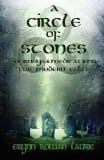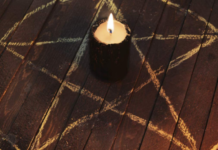 A Circle of Stones: Journeys and Meditations for Modern Celts, Second Edition, by Erynn Rowan Laurie
A Circle of Stones: Journeys and Meditations for Modern Celts, Second Edition, by Erynn Rowan Laurie
Megalithica Books, 9781905713776, 124 pp., 2012
It may be showing its age a bit, even the author admits that there have been advances in the archaeological underpinnings of the work, and increased knowledge of the language and culture of the Irish Celtic people. In spite of that, or perhaps because of it, this remains an easily understandable book, and a good source for those who wish to walk the Celtic Reconstructionist path of Paganism.
There haven’t been a lot of changes made since it was originally issued. There have been a few improvements in the translation of Irish words, and the illustrations have been redone, but the information is essentially unchanged.
There are numerous suggestions for several rituals, as well as guidelines for the creation and maintenance of altars – including suggestions for turning your entire living space into a sacred environment. One of the great things is that she emphasizes the need for the altar to work for you: it doesn’t have to be a certain size or shape, it doesn’t have to be kept overly neat and tidy, and it doesn’t need to be particularly artistic in its arrangement. It should, however, be a place which you visit frequently, thus alleviating the necessity for dusting it. After all, if you are interacting with the altar constantly, things will not remain static for very long.
Perhaps one of the biggest shortfalls in the average Pagan’s relationship with the gods, ancestors or nature spirits is the approach taken in regards to communing with them. Far too many only contact the other side when they have a problem, or to give thanks or praise. Since one of the major differences between the mainstream religions and Paganism is the accessibility of our gods (after all, we don’t need a mediator) it seems like a no-brainer to include them in our daily lives. Yet many people seem to feel that the routine of human life would be boring to the deities. Perhaps, but wouldn’t you be more inclined to help out someone who kept in touch instead of only calling on you when they were in need?
The spirits, gods and ancestors should be treated as honoured guests when they respond to your call. Hospitality is a sacred obligation in the Celtic world — and not just for those who are not physically present. As such, you should make sure you know who you are inviting, what they like (or don’t like), who they get along with and who shouldn’t be invited to the same gathering. You might consider the fact that you would more likely find them shopping at the local flea market as opposed to the local antique stores.
It is also important to consider the culture in which these deities were worshipped. They respected bravery, so subservience and grovelling are not expected. They expected their followers to be boastful (although not excessively so) and confident, so they should be approached with that confidence.
All of these details, and more, are laid out in this book. Without a doubt, this book is designed to get you started on your journey of exploration. It isn’t so much a guide book as it is a broad itinerary. It is intended to help you start without overwhelming you with too much detail. If you are looking for and excellent starter book on the topic, this is one you will want in your library.








